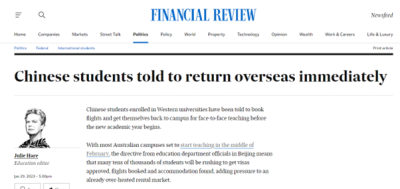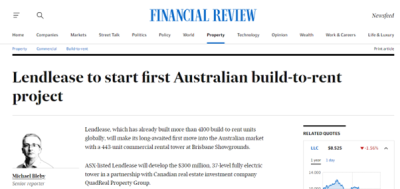If you would like to receive weekly updates like this, sign up here.
It’s always interesting when you see two key trends overlap.
Particularly if both trends align strongly with where we are in the 18.6-year Real Estate Cycle.
The icing on the cake, though, is when it completely flies in the face of what the mass media thinks is going to happen.
Because the facts on the ground are completely contradicting reports of recession or a looming property crash.
Fancy that!
I will now detail what these two trends are, and why they provide even further validation of both having knowledge of the real estate cycle and its inherent timing.
Now, you might vehemently disagree with what I am about to tell you.
But know this: after a few minutes of reading, you’ll be in no doubt about what’s coming.
These trends can’t be stopped.
And what they could mean for your future investments.
Let’s take a look.
What casual employment and the Chinese government have in common.
Unprecedented demand from Indian students is supercharging a resurgent international education market, bringing some relief to city cafes and restaurants desperate for casual staff but putting pressure on an already-tight rental market.
So said a recent Australian Financial Review (AFR) article detailing the broader trend of returning university students to Australia.
There has been a strong response to Australian universities’ recruitment drive for students from South Asian countries, including India, Pakistan, Nepal, Bangladesh, and Sri Lanka.
Probably worth mentioning here a peculiar aspect of the Australian economy: universities are one of the nation’s leading exporters of services.
And we aren’t talking chump change either. In 2019, the last full year before the covid lockdowns, it was worth over A$40 billion in export earnings.
Now, undoubtedly some of this is due to Australia’s reputation as a safe country; but it’s also been influenced by other current macro events too.
These student numbers also have a huge knock-on effect, generally most felt by the service and hospitality industries located close to these universities.
That’s because they are a highly sought after cohort of potential workers for jobs that, rightly or wrongly, most Australians believe are beneath them.
And as traditional white collared workers are now returning to their CBD located offices, demand for casual workers have skyrocketed.
There is a strong synergy here as these university students move to the big cities simply because that’s where the best universities are located.
And everything you need to make ends meet on a working holiday or student visa are within easy reach too.
So, we have identified an emerging immigration trend involving overseas university students being granted visas and moving into the nation’s biggest cities.
Australian universities have now returned to their usual export dollar earner status and those CBD white collar workers now have enough hospitality workers to meet their demands.
Is that it?
Source – AFR
In a decision only a government could possibly come up with, China has instructed its vast numbers of western-educated university students to return overseas to complete their degrees – otherwise the country will not recognize studies completed online.
These students needed to return home during the covid lockdowns, but as China re-emerges from its own long lockdown it’s now possible for these same students to complete their studies.
Most western universities offer excellent online services for completing or upgrading their degrees.
So, the rationale behind such a rushed decision eludes me.
Nonetheless, if this is what an authoritarian government wants, then that’s what it will get.
And the 35,000 Chinese applications for student visas last month shows, this may well turn into a tidal wave.
And leads directly to the second trend I wish to discuss with you today.
The sign we have been waiting for has arrived.
Take a step back for a moment. I mentioned how the return of these students into Australia was a welcomed fillip for many small businesses who rely upon casual employment to stay in business.
Well, there is a consequence for such numbers, from the above quoted AFR article. Bolded sections are my own.
However, with new enrolments at a record high, tight rental markets in major cities would result in rental prices rising even higher, said Leo Pascal Ross, from the NSW Tenants’ Union.
Rental prices for apartments in the inner-Sydney suburbs of Haymarket, Rosebery, Ultimo and Pyrmont – epicentres for international students – have all increased about 30 per cent over the past year.
Inner-city Melbourne has had a 38 per cent year-on-year increase.
What do you know?
The same specific real estate segment that’s copped the biggest blame for the so-called “catastrophic” and “historic” falls in real estate prices.
You’ll notice both italicized words mentioned in almost every media report concerning the apartment market the last 12 months.
And now, we have no choice but to welcome hundreds of thousands of Chinese students to these same markets. It’s worthwhile remembering just how closely aligned Australian universities and our federal government are.
Already the lobby groups are out in force determined to ensure the government proves no impediment to this ̶g̶o̶l̶d̶ ̶m̶i̶n̶e̶ influx of new students.
“We are already seeing Chinese students return to Australia with around 35,000 arriving this month,” Mr Clare said.
“The Chinese government’s decision could pose some short-term logistical issues and I’m working with universities and the Home Affairs Minister [Clare O’Neil] on this.”
“We also urge the Government to prioritise visa processing for all international students so that we can return to normal and minimise further disruption.”
I can hear the cash registers singing as I write this. Never underestimate the power of vested interest in a rent-seeking economy like Australia.
But I digress.
Here’s your takeaway, I mentioned a second trend emerging from this.
You better believe the timing of this is not a co-incidence.
Source – AFR
In news that did not surprise me in the slightest, Lend Lease has decided to be the first mover in a new market to cater in part on this ̶g̶o̶l̶d̶ ̶m̶i̶n̶e̶ immigration trend.
Would a huge land banking company like Lend Lease really decide to invest in such a project if the apartment market was in free fall?
Of course not! They know what’s coming.
A massive reappraisal of the best located apartment blocks exposed to major immigration inflows.
And thanks to the Australian and Chinese governments, Lend Lease is now forced to make millions selling these into a burgeoning market.
Once again, I stand before you with a simple question: who do you believe?
Is it the doom and gloom media with their incredible bias and emotional fuelled rhetoric?
Or do you think over two hundred years of real estate cycle history might have a say in this?
I’ve said it multiple times already this year: I knew that land markets in Australia and across the world would not collapse this year.
It’s because I know the hidden order of the economy and, thanks to the 18.6-year Real Estate Cycle, I also have the timing.
And its time for a land boom. The waves on the surface of the ocean may fluctuate but the key currents below are ever present.
And that sums up the real estate cycle. I don’t need to know what the exact drivers will be.
But I know when they should be coming. And so, I watch and wait. And once again, here it is.
I present to you one of the decades best opportunities for outsized gains in the right locations if apartment investing is your thing.
It’s this same type of opportunities the Boom Bust Bulletin (BBB) can teach you.
This is one of many such opportunities knowledge of the 18.6-year Real Estate Cycle can provide you. It will allow you to learn the true reasons behind why the cycle repeats for over 200 years.
And with that, your one true market advantage over everyone else: timing.
When companies like Lend Lease do deals like this, you better sit up and take notice.
I predict they will be the first of many who see an incredible opportunity to provide real value to their shareholders.
Why should you miss out too?
Start viewing the economy around you like I have so you don’t miss the next opportunity once it arises.
And develop your market edge with us.
Best wishes,

Darren J Wilson
and your Property Sharemarket Economics Team
P.S. – If you would like to receive weekly updates like this, sign up here.
P.P.S – Find us on Twitter here and go to our Facebook page here.
This content is not personal or general advice. If you are in doubt as to how to apply or even should be applying the content in this document to your own personal situation, we recommend you seek professional financial advice. Feel free to forward this email to any other person whom you think should read it.




